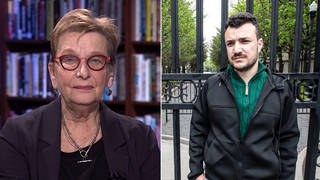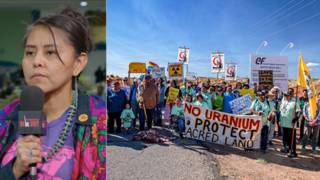
Environmental activists in California are fighting plans to store 3.6 million pounds of highly radioactive nuclear waste on a popular beach in San Diego County. In 2012, a radioactive leak at the San Onofre nuclear power plant forced an emergency shutdown. The plant was fully closed by June 2013. Now residents are fighting the permit issued by the California Coastal Commission to store the millions of pounds of nuclear waste in thin, stainless steel canisters, within 100 feet of the ocean. We speak to Ray Lutz, founder of Citizens’ Oversight, which has filed a lawsuit challenging the expansion of the nuclear waste storage facility.
Transcript
AMY GOODMAN: This is Democracy Now!, democracynow.org, The War and Peace Report. I’m Amy Goodman. We’re ending the show here in San Diego, where environmental activists are fighting plans to store 3.6 million pounds of highly radioactive nuclear waste on a popular beach in San Diego County, just about an hour north of here.
In 2012, a radioactive leak at the San Onofre nuclear power plant forced an emergency shutdown. The plant was fully closed in June of 2013. Now residents are fighting the permit issued by the California Coastal Commission to store the millions of pounds of nuclear waste in thin, stainless steel canisters within a hundred feet of the beach. The facility began the decommissioning.
We are joined now by Ray Lutz, founder of Citizens’ Oversight, which has filed a lawsuit challenging the expansion of the nuclear waste storage facility.
We just have a few minutes, Ray. Explain what’s happening.
RAY LUTZ: Well, this is a ridiculous move by this for-profit corporation to avoid public scrutiny—the 3.6 million pounds, only a hundred feet from the ocean, only inches above the salt water line at high tide. And, you know, now they have authority to leave this here forever, according to the Department of Energy, because there is no alternative, they say. Our lawsuit, though, we’re saying, you know, they didn’t investigate any alternatives, and there are other places, better places, to put this than right here, right next to the beach.
You know, this is just a government-regulators-plus-corporate-profiteers-equals-insanity sort of math equation that you get out of this—these for-profit corporations. You know, it all comes back down to the military-industrial complex is forcing these—you know, the mindset, sort of Trump mindset, of we want to be first in the nuclear world, as these plants are very uneconomic. They shouldn’t be used at all. Plus we’ve got all this waste that’s piling up at a hundred places around the county, which are virtually terrorist targets now.
So we need, as a community, to really look at and make sense of what these decisions are. And if you leave it to the for-profit corporations like Edison to decide these things that may be here for decades, if not centuries, based on their next quarterly report, you’re going to get really bad decision-making. That’s what it comes down to in this case.
You know, meanwhile, we have the $3.3 billion price tag they want the community to pay for this closed plant, due to Southern California Edison’s own mistakes in their design process for the steam generators. Shutdown in 2012, a radioactive leak, and now we know that it’s because they were trying to uprate this plant to try to get more out of it through the design, pushing the design more than it should have been with these new steam generators. And we’re glad that it shut down. You know, this is a great thing to have this plant, this waste-generating plant, shut down. But now they want the customers to pay for the plant for 10 years, as if it’s still operating, and for them to even make a profit on it after their failure. So that’s also in a mediation mode.
AMY GOODMAN: Well, Ray Lutz, we have 10 seconds. What is the larger message you feel is important to send regarding the decommissioning of nuclear plants around the country, dealing with their nuclear waste? Ten seconds.
RAY LUTZ: This is the biggest human blunder of all time. These nuclear plants are uneconomic. They should be all shut down. We’ve got to really push hard to get this industry to stop. Thank you.
AMY GOODMAN: Ray Lutz, I want to thank you for being with us, founder of Citizens’ Oversight.
As we continue our tour around the country, tonight I’ll be in Los Angeles at the Immanuel Presbyterian Church at 3300 Wilshire Boulevard speaking, then Thursday at noon in Los Angeles at Skylight Books. And at 7:00 p.m. on Thursday night, I’ll be in Santa Barbara at La Casa de la Raza; Friday in Santa Fe, New Mexico; and on Saturday in Arizona and Houston.












Media Options